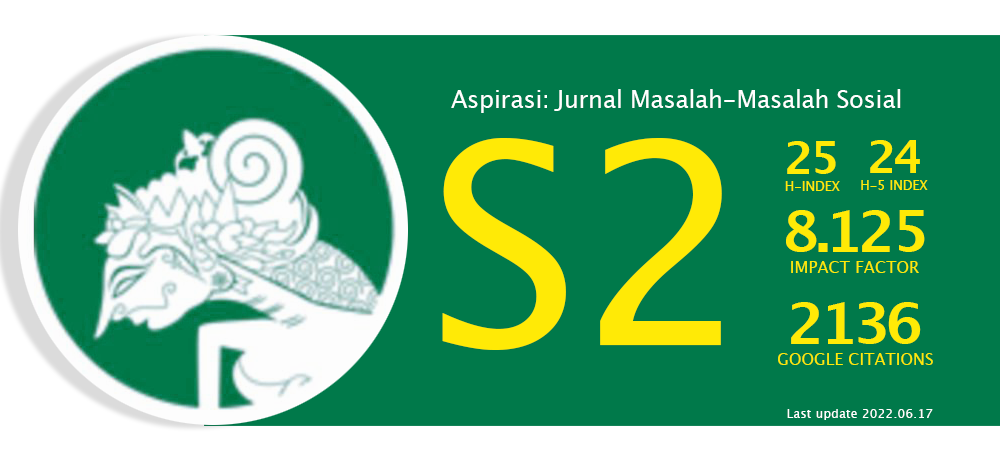Mapping Survey of Public Acceptance on Development Nuclear Power Plant (NPP) in Bangka Belitung Province
Abstract
Indonesia sebagai negara yang belum memiliki Pembangkit Listrik Tenaga Nuklir (PLTN) masih perlu melakukan riset untuk mengkaji penerimaan masyarakat. Bangka Belitung merupakan kandidat lokasi pembangunan PLTN oleh BATAN dan kepulauannya diprediksi akan menjadi pionir energi baru dan terbarukan dari mineral ringan yaitu torium. Oleh karena itu, penelitian di Bangka Belitung bertujuan untuk mengetahui penerimaan masyarakat terhadap pembangunan PLTN. Penelitian ini menggunakan metode gabungan (mixed-method), dan pengumpulan data dilakukan dengan survei pada 1.500 responden yang terdiri dari penduduk Bangka Belitung. Analisis kuantitatif dalam penelitian ini menggunakan statistik deskriptif dan uji Chi-Square, sedangkan analisis kualitatif dengan kualitatif deskriptif. Hasil penelitian menunjukkan bahwa sebagian besar masyarakat Bangka Belitung menyambut baik rencana pembangunan PLTN tersebut. Total penerimaan masyarakat di Provinsi Bangka Belitung sebesar 73,73 persen, yang didukung oleh persepsi masyarakat yang setuju dengan manfaat PLTN sebesar 94,27 persen, risiko PLTN sebesar 70,93 persen, itikad baik pengembang PLTN sebesar 92,53 persen, dan kompetensi operator PLTN sebesar 93,53 persen. Terkait jarak, masyarakat yang setuju pada pembangunan pembangkit listrik ini menginginkan jarak sejauh 30 km dari pemukiman penduduk. Belum ada indikasi fenomena not in my backyard di Bangka Belitung, tetapi masih ada kesalahan persepsi di masyarakat mengenai risiko PLTN. Dikarenakan peran pemerintah yang terbatas, Dewan Perwakilan Rakyat (DPR) perlu memfasilitasi pendampingan masyarakat dan mendorong pemerintah untuk mengimplementasikan strategi sosialisasi untuk mengedukasi manfaat dan risiko pembangkit listrik tenaga nuklir.
Abstract
Indonesia, as a country that does not have nuclear power plant (NPP), still requires research to examine public acceptance. Bangka Belitung is a candidate for NPP locations by BATAN, and the islands are predicted to become pioneers of new and renewable energy from a light mineral, thorium. Thus, research in Bangka Belitung aims to determine the public acceptance of an NPP development. This study used a mixed method, and the data were collected by survey with 1,500 respondents consisting of residents in Bangka Belitung. The quantitative analysis in this study was descriptive statistics and Chi-square test, while the qualitative analysis was with descriptive qualitative. The result showed that most Bangka Belitung people welcomed the NPP’s development plan. Total public acceptance in Bangka Belitung Province is 73.73 percent. Public perceptions agree with the benefits of NPP at 94.27 percent, the risks of NPP at 70.93 percent, the goodwill of NPP developers at 92.53 percent, and the competence of NPP operators at 93.53 percent. Regarding the distance, the neighbourhood wanted for this electric power plant to be 30 km away from the residential areas. There was no indication of the NIMBY phenomenon in Bangka Belitung, but there were still misperceptions in the community caused by perceptions of the risk of NPP. Due to the limited government role, the DPR RI must step in and facilitate community assistance while encouraging the government to devise effective strategies to develop a dissemination strategy to educate the benefits and risks of nuclear power plants.
Keywords
Full Text:
PDFReferences
Badan Pusat Statistik Provinsi Kepulauan Bangka Belitung. (2021). Luas Wilayah per Kabupaten/Kota (km2) Tahun 2017–2019. Geografi. Retrieved January 19, 2021, from https://babel.bps.go.id/indicator/153/34/1/luas-wilayah-per-kabupaten-kota.html
Badan Tenaga Nuklir Nasional. (2017, May 9). Sosialisasi iptek nuklir di Bangka Belitung Harus Terus Dilaksanakan. Badan Tenaga Nuklir Indonesia. https://www.batan.go.id/index.php/id/kedeputian/pendayagunaan-teknologi-nuklir/diseminasi-dan-kemitraan/3206-1sosialisasi-iptek-nuklir-di-bangka-belitung-harus-terus-dilaksanakan-2
Badan Tenaga Nuklir Nasional. (2017). Survei jejak pendapat IPTEK nuklir tahun 2016 [Report]. Pusat Diseminasi dan Kemitraan BATAN.
Badruddin, K. (2010). Respon masyarakat desa terhadap rencana pembangunan pembangkit listrik tenaga nuklir (PLTN) dan implikasinya bagi ketahanan wilayah: Studi di Desa Balong Kecamatan Kembang Kabupaten Jepara Provinsi Jawa Tengah [Thesis]. Universitas Gajah Mada.
Bratspies, R. M. (2009). Regulatory trust. SSRN Electronic Journal, 575–631. https://doi.org/10.2139/ssrn.1364314
Bronfman, N. C., Jimenez, R. B., Arevalo, P. C., & Cifuentes, L. A. (2012). Understanding social acceptance of electricity generation sources. Energy Policy, 46, 246–252. https://doi.org/10.1016/j.enpol.2012.03.057
Clarkson, M. E. (1995). A stakeholder framework for analyzing and evaluating corporate social performance. Academy of Management Review, 20(1), 92–117. https://doi.org/10.5465/amr.1995.9503271994
International Atomic Energy Agency. (2017). Trend in Electricity Supplied. IAEA PRIS (Power Reactor Information System). Retrieved April 6, 2023, from https://www.iaea.org/PRIS/WorldStatistics/
Invernizzi, N. (2020). Public participation and democratization: effects on the production and consumption of science and technology. Tapuya: Latin American Science, Technology and Society, 3(1), 227–253. https://doi.org/10.1080/25729861.2020.1835225
Ipsos. (2011, May 21). Public opposition to nuclear energy production. Our World in Data. Retrieved June 10, 2021, from https://ourworldindata.org/grapher/public-opposition-to-nuclear-energy-production
Jäckle, S., & Bauschke, R. (2011). Comparing socialization, cultural and individual level effects on attitudes towards nuclear energy – A multilevel analysis of 27 European countries. Politics, Culture and Socialization, 2(4), 341–366. https://www.researchgate.net/publication/331921559_Comparing_socialization_cultural_and_individual_level_effects_on_attitudes_towards_nuclear_energy_-_A_multilevel_analysis_of_27_European_countries
Jang, Y., & Park, E. (2020). Social acceptance of nuclear power plants in Korea: The role of public perceptions following the Fukushima accident. Renewable and Sustainable Energy Reviews, 128. https://doi.org/10.1016/j.rser.2020.109894
Kartono, D. T., Hastjarjo, S., Sajidan, Effendi, B. S., Ashari, D. K., Wijayanto, P. K., Saraswati, Z. N., & Christy, A. Y. (2023). Acceptable level of acceptance and the affecting factors: what is the acceptable public acceptance of building a nuclear power plant. Science and Technology of Nuclear Installations. https://doi.org/10.1155/2023/8923578
Keputusan Menteri Energi dan Sumber Daya Mineral Nomor 39 K/20/MEM/2019 tentang Pengesahan Rencana Usaha Penyediaan Tenaga Listrik PT Perusahaan Listrik Negara (Persero) Tahun 2019 sampai dengan Tahun 2028. (2019).
Kusumo, R. (2021, April 28). Mengenal Thorium, Nuklir Hijau asal Bangka Belitung yang Diincar Perusahaan AS. Good News From Indonesia. https://www.goodnewsfromindonesia.id/2021/04/28/thorium-nuklir-hijau-bangka-belitung-yang-diincar-perusahaan-as
Laksono, P. M., Mundayat, A. A., & Subagya, Y. T. (1995). Rencana pembangunan PLTN di Indonesia: sebuah perbincangan. Yayasan Obor Indonesia.
Mudjiono, Alimah, S., Susiati, H., Irawan, D., & Bustomi, M. (2019). Penerimaan masyarakat sekitar Puspiptek Serpong terhadap rencana pembangunan reaktor daya eksperimental. Jurnal Pengembangan Energi Nuklir, 20(2), 105. https://10.17146/jpen.2018.20.2.5044
Murakami, T., & Anbumozhi, V. (2019). Public acceptance of nuclear power plants in hosting communities: a multilevel system analysis [Report]. ERIA. Retrieved January 7, 2020, from https://www.eria.org/publications/public-acceptance-of-nuclear-power-plants-in-hosting-communities-a-multilevel-system-analysis/
Nakayama, C., Sato, O., Sugita, M., Nakayama, T., Kuroda, Y., Orui, M., Iwasa, H., Yasumura, S., & Rudd, R. E. (2019). Lingering health-related anxiety about radiation among Fukushima residents as correlated with media information following the accident at Fukushima Daiichi Nuclear Power Plant. PLoS ONE, 14(5), 1–17. https://doi.org/10.1371/journal.pone.0217285
Putra, I. R. (2022, January 17). Pemerintah kaji Bangka Belitung dan Kalimantan jadi lokasi pengembangan PLTN. Merdeka.com. https://www.merdeka.com/uang/pemerintah-kaji-bangka-belitung-dan-kalimantan-jadi-lokasi-pengembangan-pltn.html
Rankin, W. L., Melber, B. D., Overcast, T. D., & Nealy, S. M. (1981). Nuclear power and the public: An update of collected survey research on nuclear power [Report]. Human Affairs Research Centers. https://doi.org/10.2172/5271934
Sugiawan, Y., & Managi, S. (2019). Public acceptance of nuclear power plants in Indonesia: Portraying the role of a multilevel governance system. Energy Strategy Reviews, 26, 1–11. https://doi.org/10.1016/j.esr.2019.100427
Sundström, A., & McCright, A. M. (2016). Women and nuclear energy: Examining the gender divide in opposition to nuclear power among swedish citizens and politicians. Energy Research & Social Science, 11, 29–39. https://doi.org/10.1016/j.erss.2015.08.008
Taherdoost, H. (2018). A review of technology acceptance and adoption models and theories. 11th International Conference Interdisciplinarity in Engineering, 22, 960–967. Targu-Mures: Procedia Manufacturing. https://doi.org/10.1016/j.promfg.2018.03.137
Venables, D., Pidgeon, N. F., Parkhill, K. A., Henwood, K. L., & Simmons, P. (2012). Living with nuclear power: Sense of place, proximity, and risk perceptions in local host communities. Journal of Environmental Psychology, 32(4), 371–383. https://doi.org/10.1016/j.jenvp.2012.06.003
Wang, F., Gu, J., & Wu, J. (2020). Perspective taking, energy policy involvement, and public acceptance of nuclear energy: Evidence from China. Energy Policy, 145, 111716. https://doi.org/10.1016/j.enpol.2020.111716
Wang, J., & Kim, S. (2018). Comparative analysis of public attitudes toward nuclear power energy across 27 European countries by applying the multilevel mode. Journal of Sustainability, 10(5), 1–21. https://doi.org/10.3390/su10051518
WIN-Gallup International. (2011, April 19). Nuclear energy global poll. Red C & WIN/Gallup International. Retrieved June 10, 2021, from https://www.redcresearch.com/nuclear-energy-global-poll-red-c-wingallup-international/
Wisnubroto, D. S., Ruslan, Irawan, D., & Erni, T. (2019). Public opinion survey on nuclear energy in Indonesia: Understanding public perception on nuclear power plant program. AIP Publishing. https://doi.org/10.1063/1.5135551
Wolsink, M. (2018). Social acceptance revisited: gaps, questionable trends, and an auspicious perspective. Energy Research & Social Science, 46, 287–295. https://doi.org/10.1016/j.erss.2018.07.034
World Nuclear Association. (2017). Nuclear Power United Arab Emirates. World Nuclear Association. Retrieved January 20, 2021, from https://world-nuclear.org/information-library/country-profiles/countries-t-z/united-arab-emirates.aspx#ECSArticleLink3
Wright, P. D. (2008). Reconsidering public acceptance of renewable energy technologies: a critical review. In Delivering a Low Carbon Electricity System: Technologies, Economics and Policy (pp. 1–15). Cambridge University Press.
Xiao, Q., Liu, H., & Feldman, M. W. (2017). How does trust affect acceptance of a nuclear power plant (NPP): A survey among people living with Qinshan NPP in China. PloS One, 12(11), 1–16. https://doi.org/10.1371/journal.pone.0187941
Yudha, S. W., & Tjahjono, B. (2019). Stakeholder mapping and analysis of the renewable energy industry in Indonesia. Energies, 12(4), 1–19. https://doi.org/10.3390/en12040602
DOI: https://doi.org/10.46807/aspirasi.v14i1.3143
Refbacks
- There are currently no refbacks.







